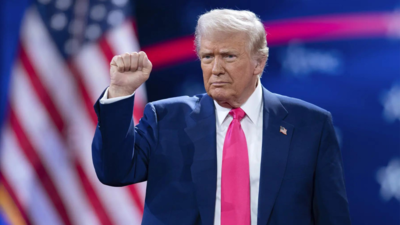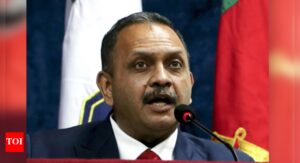‘Getting ready to do it’: Donald Trump renews push for reciprocal tariffs on India, China

US President Donald Trump has announced that his administration will “soon” impose reciprocal tariffs on countries like India and China. Speaking at the swearing-in ceremony of commerce secretary Howard Lutnick on Friday, Trump reiterated that the US would mirror the tariff policies of its trading partners, ensuring a level playing field.
Trump was quoted by the news agency PTI saying,“We’ll soon impose reciprocal tariffs because that means, they charge us, we charge them.It’s very simple,” Trump said in Washington. “Whatever a company or a country, such as let’s say India or China or any of them, whatever they charge, we want to be fair … so reciprocal. Reciprocal meaning, ‘they charge us, we charge them’”.
‘We haven’t done that, we have never done that. We are getting ready to do it,” he added.
The announcement follows Trump’s recent discussions with Prime Minister Narendra Modi during the latter’s visit to the US capital. Trump had conveyed the same message to PM Modi, making it clear that India would not be exempt from Washington’s tariff policies. “I told Prime Minister Modi yesterday – he was here – I said, ‘Here’s what we’re going to do: reciprocal. Whatever you charge, I’m charging,’” Trump said in an interview with Fox News earlier this week.
India’s tariff policy and response
India has maintained that its tariffs are within the limits set by the World Trade Organization (WTO). According to sources, India’s average tariffs stand at around 17%, which has been gradually reduced over time. The government has also signalled its willingness to negotiate with the US on a bilateral basis but insists that reductions cannot be across the board, particularly given geopolitical considerations involving China, reported PTI.
To address US concerns, India has already made some tariff concessions, including reducing duties on bourbon whiskey and motorcycles, benefiting American brands like Harley-Davidson.
However, the US continues to push for further cuts. Officials in India are closely monitoring Washington’s moves and assessing the potential impact of reciprocal tariffs on specific industries.
They remain uncertain whether Trump’s policy will be country-specific or product-specific and whether non-tariff barriers will also come into play.
Trump’s tariff strategy extends beyond India
Trump’s aggressive tariff policy is not limited to India. Since returning to office, he has escalated tariff measures against major US trading partners, including China, Canada, Mexico, and the European Union. Earlier this month, he imposed an additional 10% duty on Chinese imports and is reportedly considering a 25% tariff on lumber.
China, in response, has hit back with retaliatory tariffs, imposing 15% duties on US coal and liquefied natural gas, and 10% on oil, agricultural machinery, and vehicles.
The Chinese foreign ministry urged Washington to handle trade disputes with “mutual respect” and warned that tariff wars “have no winners and only serve to damage the interests of people all over the world”.
Meanwhile, the European Union has warned of a firm response if the US imposes tariffs on European goods, with European Commission Vice President Maros Sefcovic calling US-EU trade relations a “win-win partnership.”
Trump’s push for reciprocal tariffs is part of his broader effort to reduce the US trade deficit, which stood at $295.4 billion with China in 2024, according to the Bureau of Economic Analysis.
However, economic experts caution that tariffs could lead to higher costs for American consumers rather than significantly hurting foreign exporters.






